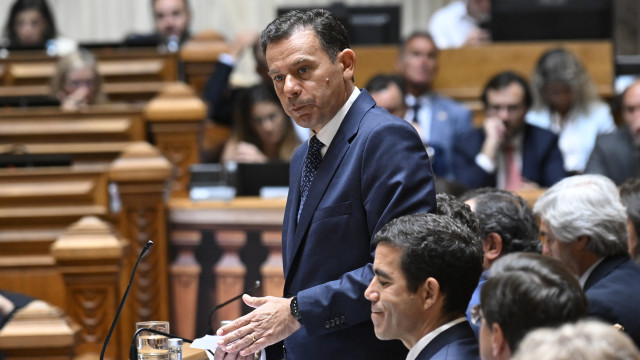Nationality law? Chega claims "blockage" and AR points out "mistake"

© Horacio Villalobos#Corbis/Corbis via Getty Images

Chega leader André Ventura accused the President of the Assembly of the Republic, José Pedro Aguiar-Branco, of having backed down on changes to the nationality law just because Chega had presented the bill and, thus, having created a political "blockade" for the party. In response, an official source from José Pedro Aguiar-Branco's office said that this was a "mistake" on the part of André Ventura . But what is really at stake?
At the end of the morning, after the meeting of the Chega Parliamentary Group in the Assembly of the Republic, Ventura stated that people were "talking in opposite directions".
"It's a bad sign for the legislature and democracy," he told journalists.
According to André Ventura, Aguiar-Branco considered the Chega project - which aims to ensure that those who have committed crimes lose their nationality - "unconstitutional" , despite Luís Montenegro having already defended it during the presentation of the Government's program, at the beginning of the week.
He also referred to the arguments given by Aguiar-Branco to support his position: "the loss of nationality will violate the existing constitutional right to have a nationality", something that Ventura guarantees "corresponds to 0.0001% of situations".
However, after these accusations, Ventura announced that he will propose, in a potestative manner, a parliamentary commission of inquiry into the actions of the last PS and PSD/CDS governments in granting nationality and residence to foreign citizens.

The president of Chega announced today that he will propose, in a potestative manner, a parliamentary commission of inquiry into the actions of the last PS and PSD/CDS governments in granting nationality and residence to foreign citizens.
Lusa | 14:03 - 20/06/2025According to the president of Chega, this parliamentary commission of inquiry, "must investigate to the fullest extent, without limitations on people or positions, who was responsible for the disorganized entry of people into Portugal, many of them with registration, without any verification".
Aguiar-Branco speaks of "misunderstanding"
In response to the Chega leader, the President of the Assembly of the Republic denied having already issued a ruling rejecting a Chega project on changes to the nationality law and considered that André Ventura is "wrong" when he complains of political blockade , contradicting the statements of the president of the far-right party.
An official source from José Pedro Aguiar-Branco's office explained that "the President of the Assembly of the Republic has not yet made any decision on the admissibility of the Chega diploma, which is still under consideration".
The Chega bill with amendments to the nationality law, however, has already been the subject of a negative opinion , although not binding, by the Parliament's services, which considered it not in accordance with the Constitution of the Republic. However, the President of the Assembly of the Republic has not yet signed any order to that effect.
According to the provisions of article 120 of the Rules of Procedure of the Assembly of the Republic, bills and proposed amendments that violate the Constitution or the principles enshrined therein are not permitted.
In this opinion from Parliament , doubts are raised regarding the Chega diploma, firstly due to the circumstance that a penalty involves as a necessary effect the loss of civil, professional or political rights.
To this end, professors Jorge Miranda and Rui Medeiros are quoted: "With regard to those who are Portuguese, the fundamental right translates into the right not to be deprived of Portuguese citizenship or, more strictly, the right not to be deprived of it through arbitrary or disproportionate measures. (...) Furthermore, under the terms of paragraph 4 of article 30 [of the Constitution], the loss of citizenship cannot constitute a necessary effect of the application of a criminal penalty".
On the other hand, the Chega project, " by discriminating between citizens who have acquired Portuguese nationality through naturalization and citizens with original nationality (provided they have another nationality, to avoid becoming stateless), may also be analyzed whether it violates the principle of equality , provided for in article 13 of the Constitution".
It should be recalled that the subject of the review of the nationality law was raised by the Prime Minister, Luís Montenegro, during the debate on the Government Programme, in which he stated that the proposal to review the nationality law will have three main axes, including an extension of the situations in which nationality may be lost, namely serious behaviour "of a criminal nature".

The Prime Minister said today that the proposal to review the nationality law will have three main axes, including an expansion of the situations in which nationality may be lost, namely serious behavior "of a criminal nature".
Lusa | 13:06 - 17/06/2025In response to a request for clarification from the CDS, the Prime Minister also recalled that the intention to review the nationality law was already included in the AD's electoral programme and that it involves a "more regulated" and "more controlled" immigration policy.
Greater control over immigration is one of the main lines of the programme of the second executive headed by Luís Montenegro, with plans in place to extend the minimum period of residence and effective presence in national territory (currently five years) and eliminate the possibility of illegal stay being considered for counting purposes.
Read Also: Montenegro announces 1,500 more police officers and review of nationality law
noticias ao minuto





